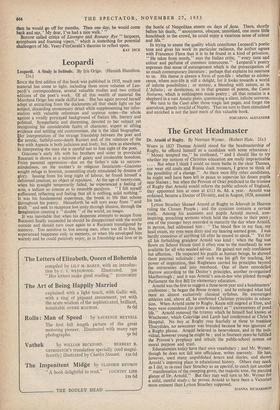Leopardi • Leopardi. A Study in Solitude. By Iris Origo.
(Hamish Hamilton. 21s.) SINCE the first edition of this book was published in 1935, much new material has come to light, including three more volumes of Leo- pardi's correspondence, several valuable studies and two critical editions of the poet's work. Of all this wealth of material the Marchesa Origo has made skilful use. She has again proved herself adept at extracting from the documents all that sheds light on her subject, discarding unnecessary detail while supplementing her infor- mation with valuable references and • copious notes—the whole against a vividly portrayed background of Italian life, literary and political. Sympathetic and discerning, devoted to her subject yet recognising his considerable faults of character, expert at sifting evidence and settling old controversies, she is the ideal biographer. }Jer interpretation of the strange friendship between the poet and the erratic, faithful-unto-death Ranieri and of the relations of the two with Aspasia is both judicious and lively, but, here as elsewhere, in interpreting the man she is careful not to lose sight of the poet.
Giacomo's early life with his brothers and sister in provincial Recanati is shown as a mixture of gaiety and intolerable boredom. From parental oppression—due on the father's side to narrow- mindedness, on the mother's to religious fanaticism—Giacomo sought refuge in feverish, unremitting study stimulated by dreams of glory. Issuing from his long night of labour, he found himself a deformed creature, an object of repulsion. At the age of twenty-one, when his eyesight temporarily failed, he experienced a feeling of noia, a tedium so intense as to resemble paralysis. " I felt myself suffocated, reflecting and feeling that all is nothing, solid nothing." It was his fundamental experience, the break in life that echoes throughout his poetry. Henceforth he will turn away from "arid truth " and seek to recapture lost unity through illusion, through the imagination creating a " double " of the world, an imago. It was inevitable that when his desperate attempts to escape from Recanati finally succeeded he should be disappointed with the world outside and should turn once again to a Recanati transfigured by memory. Too sensitive to live among men, often too ill to live, he experienced happiness only in memory, or when life enveloped him warmly and he could passively enjoy, as in friendship and love or in
the bustle of Neapolitan streets on days of festa. There, shortly before his death, " anonymous, obscure, unnoticed, one more little hunchback in the crowd, he could enjoy a vicarious sense of colour and life."
In trying to assess the quality which constitutes Leopardi's poetic tone and gives his work its particular radiance, the author agrees with Francesco Flora that it is to be found in a kind of privation. !` He takes from words," says the Italian critic, " every taste and colour and perfume of common intercourse." Leopardi's poetry expresses that sense of estrangement which is the preoccupation of so much contemporary literature ; perhaps that explains his nearness to us. His theme is always a form of non-life : whether as adoles- cence, where non-life is still a delight, for it looks towards a world of infinite possibilities ; or ecstasy, a blending with nature, as in L' Infinito ; or dereliction, as in that greatest of poems, the Canto Notturno, which is nothingness made poetry ; all that remains is a shepherd in a vast Asiatic plain, questioning a silent, infinite universe.
We turn to the Canti after those tragic last pages, and forget the querulous, greedy invalid of Naples. That we turn to them stimulated and enriched is not the least merit of this valuable book.
FOSCARINA ALEXANDER
































 Previous page
Previous page